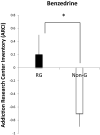High Recreational Gamblers Show Increased Stimulatory Effects of an Acute Laboratory Gambling Challenge
- PMID: 32406011
- PMCID: PMC7882579
- DOI: 10.1007/s10899-020-09952-3
High Recreational Gamblers Show Increased Stimulatory Effects of an Acute Laboratory Gambling Challenge
Abstract
Gambling in moderation is a socially acceptable behavior and over 60% of the Swedish population gambles every year. It has been seen that slot machines are one of the most addictive and problematic forms of gambling and contribute highly to an addictive behavior. It is unclear why some individuals intensify their gambling behavior over time to extreme levels while others do not. Initial positive response of a drug or as in this case a gambling behavior, most likely influences the likelihood of continuing use in non-addicted individuals. Therefore, we wanted to investigate if recreational gamblers show an altered subjective response to an online gambling challenge, e.g. to casino gambling. The present study was designed to examine the subjective effects after an acute gambling challenge, in healthy recreational gamblers compared with non-gamblers. Eighty-two subjects participated in the study. They were challenged with an acute online slot machine gambling challenge and self-report questionnaires of mood and blood pressure were taken before and after gambling. The gamblers, and more specifically the high recreational gamblers, reported increased stimulative effects after the gambling challenge in comparison to the non-gamblers. Findings suggests that gamblers experience significantly higher arousal effects to an acute online slot machine challenge. This response may be a uniquely predictive behavior for increased risk of gambling addiction.
Keywords: Gambling addiction; Recreational gamblers; Slot machine; Subjective effects.
Conflict of interest statement
Author A: Anna Söderpalm Gorgh declares that she has no conflict of interest. Author B: Louise Caroline Miller declares that she has no conflict of interest.
Figures




Similar articles
-
The importance of friends and family to recreational gambling, at-risk gambling, and problem gambling.BMC Public Health. 2018 Aug 30;18(1):1080. doi: 10.1186/s12889-018-5988-2. BMC Public Health. 2018. PMID: 30165837 Free PMC article.
-
Virtual addictions: An examination of problematic social casino game use among at-risk gamblers.Addict Behav. 2017 Jan;64:334-339. doi: 10.1016/j.addbeh.2015.12.007. Epub 2015 Dec 17. Addict Behav. 2017. PMID: 26739340
-
Flow and dissociation: examination of mean levels, cross-links, and links to emotional well-being across sports and recreational and pathological gambling.J Gambl Stud. 2006 Fall;22(3):289-304. doi: 10.1007/s10899-006-9017-5. J Gambl Stud. 2006. PMID: 16826458
-
[Types of pathological gamblers].Psychiatr Hung. 2009;24(4):238-47. Psychiatr Hung. 2009. PMID: 19949242 Review. Hungarian.
-
Gambling behaviors during COVID-19: a narrative review.J Addict Dis. 2022 Apr-Jun;40(2):208-216. doi: 10.1080/10550887.2021.1971942. Epub 2021 Sep 17. J Addict Dis. 2022. PMID: 34533420 Review.
Cited by
-
Subjective and Cardiovascular Responses to an Acute Laboratory Gambling Task in Men and Women.Front Psychiatry. 2022 Jun 6;13:702298. doi: 10.3389/fpsyt.2022.702298. eCollection 2022. Front Psychiatry. 2022. PMID: 35733803 Free PMC article.
References
-
- Anderson G, Brown R. Real and laboratory gambling, sensation-seeking and arousal. British Journal of Psychology. 1984;75(3):401–410. - PubMed
-
- Babor T, de La Fuente J, Saunders J, Grant M. AUDIT: The alcohol use disorders identification test. Geneva: Guidelines for Use in Primary Health Care World Health Organization; 1992.
-
- Bergh C, Eklund T, Södersten P, Nordin C. Altered dopamine function in pathological gambling. Psychological Medicine. 1997;27(2):472–475. - PubMed
-
- Bergh C, Kühlhorn E. The development of pathological gambling in Sweden. Journal of Gambling Studies. 1994;10(3):261–274. - PubMed
-
- Blanchard E, Wulfert E, Freidenberg B, Malta L. Psychophysiological assessment of compulsive gamblers' arousal to gambling cues: A pilot study. Applied Psychophysiol Biofeedback. 2000;25(3):155–165. - PubMed
MeSH terms
LinkOut - more resources
Full Text Sources
Medical

